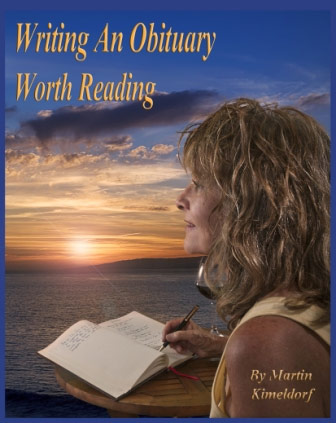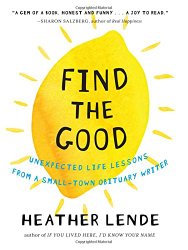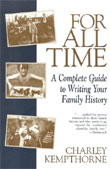How To Write An Obituary - Delicate Questions
The writing of an obituary raises many questions about describing life and death. These are listed as questions, with some of my thoughts. Most importantly, these issues are a reminder that many issues could be better resolved if the person wrote their own obituary, or were interviewed before death to help in creating a life story.
Here are some delicate questions:
Never say die?
The first question: How do you define death? Does one matter-of-factly "die"? Gently "pass away?" Or poetically "shuffle off this mortal coil"? Interestingly, this question is not a new one. The root of the word "obituary" is the Latin word "obitus" meaning "departure" or "encounter." In other words, even the Romans were searching for a euphemism for "death." (Read more in the Online Etymology Dictionary.) Whatever you prefer, the choice is yours. (The website "Dead and Buried" listed more than 200 such phrases, but it is no longer operating.)
Cause of death?
Should it be spelled out, or merely hinted at in the request for memorial donations?
Suicide?
Again, should this be spelled out, hinted at, or avoided altogether? Being married to a mental health professional, I am aware that suicide is much more common than most people think. I have come to believe that if more people were more aware of its fairly commonplace reality - and the resources available - they might seek out help beforehand. How many would have regretted taking the step of what is often a permanent solution to a temporary problem? However, how much obligation does the family of someone who has committed suicide have to help prevent others from doing so?
Who’s in and who’s out?
Who among the relatives and in-laws should be included? Sticky questions can emerge when family members are estranged, or when there has been divorce and re-marriage. Better to contemplate these questions as early as possible. Here is a thought: readers of obituaries will notice some omissions and wonder why, perhaps it is better to acknowledge the situation quickly and then move on.
Gay?
What do the family or friends say? What would the deceased person want to have said? Does a discrete listing of a "life partner" or "companion" work, or is a more direct description appropriate? Sometimes, two entirely different obituaries of one person have been submitted by different factions of the family.
(See the article Sally Ride comes out in obituary from the Washington Blade, a gay community newspaper.)
See Also:
Obituary Writing Pitfalls
Obituary Template
Obituary Writing Tips
Ordinary Lives,
Extraordinary Stories
Helping Families Deal with Death "Most Satisfying Work" for Funeral Celebrant
More From Obituary Guide:
- Writing Your Own Obituary Offers Chance for Reflection
- How to Write a Legacy Letter (Ethical Will)
- A Family History Writing Workshop
- Helping Families "Most Satisfying Work" for Funeral Celebrant
- Be Prepared: Will, Health Care Directive (Living Will), and More
Books You May Find of Interest:
Not Quite What I Was Planning:
Six-Word Memoirs

Writing an Obituary Worth Reading:
A Guide to Writing a Fulfilling Life Review

Find the Good:
Unexpected Life lessons From a Small-Town
Obituary Writer

Having the Last Say:
Capturing Your Legacy in One Small Story

Obit:
Inspiring Stories of Ordinary People Who Led Extraordinary Lives
For All Time:
A Complete Guide to Writing Your Family History

Thrive:
The Third Metric to Redefining Success and Creating a Life of
Well-Being, Wisdom, and Wonder

Press Ctrl + D to Bookmark this page

